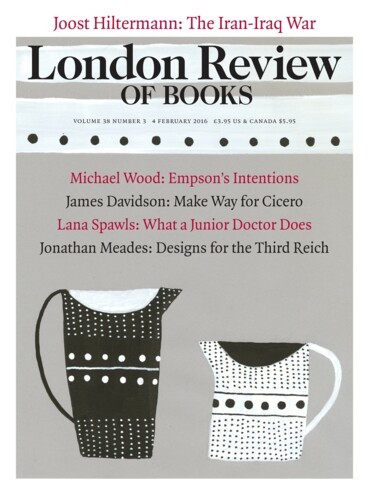It takes a moment to get your bearings at anti-asylum demonstrations in Germany these days. It still seems strange to see neo-Nazis and Pegida protesters waving French flags. The other day I got caught up in one of their barricades outside the central railway station in Cologne. The defenders of the fatherland wore black, carried placards with crossed out mosques, and had reserved their space well in advance. ‘Salafists get out! Salafists get out!’ they shouted through their loudspeakers. On the other side of a thin buffer of police, a haphazardly assembled chorus of counter-protesters yelled: ‘Shut the fuck up!’ and ‘There’s no right to Nazi propaganda!’
The space outside the station is a favourite demo site for the right, whose numbers have been swelling in North Rhine-Westphalia. The New Year’s Eve assaults on more than five hundred women – 31 men have so far been charged, including 18 refugees – have given Cologne a new symbolism. The German far right has got what it wanted: its own version of the Charlie Hebdo and Bataclan attacks, and a more resonant excuse for calling for the closing of the borders. Raise the Tricolore!
The German press has mostly obliged them in its coverage of the Cologne attacks. A few months ago, the populist tabloid Bild was hedging on the asylum question. It ran side-by-side photos of Syrian refugees and Germans fleeing the GDR a week before it printed the photo of three-year-old Alan Kurdi dead on a Turkish beach. But the commitment to the refugees was always conditional.
The worthies of the German press are now rushing to make clear their new vigilance. The mainstream Munich magazine Focus printed a photo of a naked white woman with black handprints on her body. The left-of-centre Süddeutsche Zeitung ran a cartoon on its cover of a black hand splayed over a white woman’s crotch. The right-of-centre Frankfurter Allgemeine went on the statistical counter-offensive, suggesting that parallels between the Cologne sexual assaults and the sexual assaults that take place every year at Oktoberfest in Munich were out of place. But they fudged the numbers and compared the total number of crimes reported in Cologne to the total number of reported sexual assaults in Munich.
‘Open borders will close open hearts,’ Josef Joffe wrote in Die Zeit. The paper published the results of some ‘studies’, which claimed, for instance, that 42.3 per cent of men of North African descent think it’s OK for a woman to go out at night without her male partner, compared with 85.3 per cent of Germans (both groups seemed to think that cleaning bathrooms is women’s work). Joffe also wrote that too many young single men were coming as asylum seekers to Germany. But he didn’t suggest that one solution to this problem might be to make it easier for their families to join them.
The media seem to have taken to heart the right-wing accusations that they are part of a ‘left-wing conspiracy’. German editors have an informal agreement not to mention the ethnic background of criminal suspects unless it ‘justifiably clarifies the understanding of the reported fact’. (The Third Reich required the press to use racial markers.) In the first days after the Cologne attacks, many newspapers, lacking evidence about the number of asylum seekers involved, were careful not to reach for conclusions, thus earning the ire of the German right.
Now, however, papers are trying hard to make up for their earlier restraint, and they are not about to stop teasing new meanings out of what happened in Cologne. Nowhere near this amount of coverage was devoted to the 13-year-old Tunisian girl severely beaten by neo-Nazis on New Year’s Eve in Chemnitz, or the window-smashing rampage of more than two hundred Pegida supporters on that same night through a left-wing area of Leipzig, much less to the 222 refugee shelters that were burned in Germany last year, resulting in only four convictions. Meanwhile, the biggest anti-terrorist trial in the Federal Republic since that of the Red Army Faction in the 1970s is taking place. Beate Zschäpe is accused of complicity in the murder of ten people, including nine German men of Turkish and Greek origin, in the 1990s as a member of a group calling itself the National Socialist Underground. For a decade, the German press persisted in believing that their murder spree was the work of the Turkish mafia, referring to it as the ‘Döner Morde’ (‘kebab killings’). On that occasion ethnic background justifiably clarified the reported fact.
Far from seeing the events in Cologne as evidence that wherever in the West more than a thousand extremely drunk men congregate, women are likely to be attacked, the media are straining to treat the affair as a paradigmatic culture clash (they don’t seem to be worrying much about how to square radical Islamism with public drunkenness). Merkel has done little except to say that she will work to expel refugees who commit crimes (in other words, she will enforce the law). But new management has been brought in. The new boss of LAGeSo, the main refugee processing centre in Berlin, used to work for McKinsey.
Send Letters To:
The Editor
London Review of Books,
28 Little Russell Street
London, WC1A 2HN
letters@lrb.co.uk
Please include name, address, and a telephone number.

